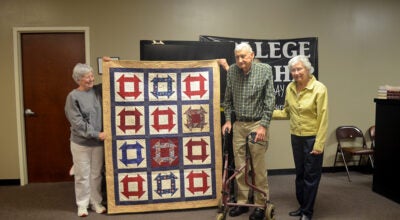Service dog gives physical and emotional security
Published 10:08 pm Saturday, June 6, 2009
Tabitha Gorman might have a disability, but she is not disabled.
She is a third year student at the University of Florida. Her grades are outstanding and she is actively involved in many campus activities.
And, she has no doubts that she can overcome any obstacles in her path and rise to any challenges before her.
That���s just Tabitha Gorman.
She views any obstacle as a challenge, and she thrives on challenges.
Tabitha was challenged from birth.
She was born with a developmental defect, spina bifida, and even that is a challenge that she faces head-on and with optimism and confidence.
Moving far from home to attend college and living on her own was not a frightening venture — it was an adventure.
“I knew that I could to it,” Tabitha said. “I manage really well with my wheelchair, but it doesn’t give me all of the mobility that I would like. I can walk but my feet get tangled at times, and I fall. Then, it’s hard for me to get up. I sometimes lose my balance when I walk and stand, and I wanted to be able to move about without my wheelchair. I heard about New Horizons Service Dogs and I was very interested. I love animals, and I was excited about the possibility of having a service dog of my own.”
A service dog is a one that has been professionally trained to assist a person with a disability by performing specifically needed physical tasks.
Tabitha needed a dog that could give her the confidence and security to leave her wheelchair behind and she also knew that she would enjoy the companionship of a dog.
“A service dog would also be a deterrent as I move about campus and other public places because, otherwise, I might give the appearance of being a vulnerable young lady,” she said.
Tabitha applied for a service dog through New Horizons Service Dogs in Orange City, Fla. and was approved.
“New Horizons service dogs are black and yellow labs and golden retrievers,” Tabitha said. “When they are about eight-weeks old, they are fostered by volunteers for 16 to 20 months before they are assigned to a recipient.
“My service dog, Rezzie is a golden retriever. He was foster by a prison inmate in the Puppies Behind Bars program. Inmates are paired with a service dog and are responsible for teaching it basic obedience skills and socializing it to enter the real world. The inmates probably benefit from the training as much as the dogs because it gives them something worthwhile to do and a feeling of accomplishment.”
Socializing the dogs is the main component of a puppy raiser’s task because socialization is what helps the dogs become confident.
Tabitha said confidence is the most important trait for a working dog to have, but confidence is not hereditary and can’t be bred into dogs. Dogs become confident by being around human beings and being introduced to a variety of situations.
Because the Puppies Behind Bars service dogs are in a limited and controlled environment, they are furloughed most weekends, so they can become accustomed to sounds and situations they don’t experience in the prison.
After the initial phase of training is completed, the service dogs undergo a six-month intensive training program that teaches the dogs more than 80 commands and proper public etiquette. Professional trainers work with the dogs to train them to achieve at the high level of commands needed by the recipients.
At the end of this period, the dogs are evaluated for performance and temperament and then paired with an appropriate recipient. Then the two train together.
“Rezzie and I hit it off from the very start,” Tabitha said. “We were just right for each other.”
Tabitha and Rezzie attended two weeks of intensive training that included field trips to expose him to different situations.
“We went to different places to see how he would react in different situations,” Tabitha said. “I had to learn what distracts Rezzie and how to keep him focused on me and my needs. We went on a boat ride to see how he would react around water and to malls and restaurants.”
Tabitha said she was amazed at what service dogs can do and the different people who can benefit from them.
“One man in training was a Vietnam veteran and a lady was there who had twins that have seizures,” she said. “Her dog was trained to detect seizures. If one of the twins had a seizure during the night the dog could alter her. Another lady had a child with autism and a service dog was trained to respond to the child’s special needs.”
Tabitha said some service dogs are being used with veterans who are suffering from posttraumatic stress disorder.
“Among other things, their service dogs are trained to bring them back to reality from a flashback,” she said. It’s just amazing what these service dogs can do for others and for me.”
On May 18, Tabitha and Rezzie came home to Troy for the summer. Thirty days is the rule of thumb for bonding time between a service dog and its companion.
“During this time, I’m the alpha,” Tabitha said. “I’m the only one for Rezzie. I’m responsible for all of his care. I am the one. During this time, no one else is to feed him, pet him or give him any commands. It’s just me and Rezzie.”
Tabitha said that she and Rezzie already are devoted companions.
“When we go into a restaurant, Rezzie goes immediately and lies under the table,” Tabitha said. “He doesn’t move until he is given the command when we are ready to leave. No one even knows that he’s there unless they see us come in. Rezzie has really been a help steadying me when I stand. Several times I’ve fallen and I’ve given him the command, ‘brace’ and he makes himself as steady as a stone wall and I can right myself.”
Rezzie is a great help ‘fetching’ items for Tabitha, relieving her of the effort.
“He is completely trained to the point of waiting for the command to ‘go busy,’” Tabitah said, with a smile. “I feel physically and emotionally secure with Rezzie at my side. I’m very fortunate to have him and without New Horizons Service Dogs this would not be possible.”
Tabitha’s expenses involved in the placement of her service dog have been minimal – his vest, collar and custom made harness.
However, the cost necessary to bring a dog to the point of certification and placement is $20,000.
New Horizons Service Dogs is a not-for-profit program and, when possible, recipients are asked to help raise funds for the organization.
Tabitha’s grandmother, Katie Hale, is a member of American Legion Post 70 Auxiliary and the auxiliary will host a spaghetti supper as a fundraiser for the organization in the coming weeks.
“This is such a wonderful program and I’ve seen how much it means to Tabitha,” Hale said. “We want to do something in the way of saying ‘thank you’ for Rezzie and for all the other dogs that are making a positive difference in the lives of so many people with disabilities.”



